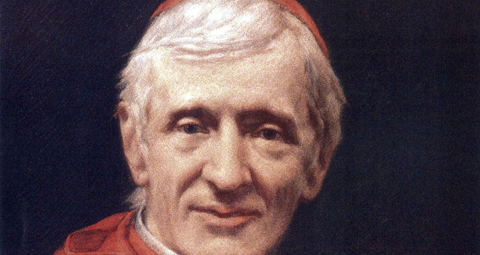July 26 | ![]() 0 COMMENTS
0 COMMENTS ![]() print
print

Birmingham’s Revolutionary Giants inspire us to build up society
Ross Ahlfeld visits Birmingham, the home of the soon to be canonised Cardinal Newman, and reflects on the memory of the saint and a pioneering Scottish inventor.
Like most other Catholics in the UK I was delighted to learn recently, that Blessed Cardinal John Henry Newman is to be finally proclaimed a saint later this year. It was especially pleasing to hear this news while I was in Edgbaston in Birmingham, home to the magnificent Oratory Church founded by Cardinal Newman, which now serves as the national shrine to him.
I was in the English city to visit St Paul’s Reformed Church in the Jewellery Quarter of the city, where the great Scottish inventor James Watt worshipped.
2019 marks the 200th year since the death of Watt, Greenock’s most illustrious son. He was born in 1736 in Greenock, but later moved to Birmingham to enter into a business partnership with his equally notable friend Matthew Boulton. It was in Birmingham that Watt made his ground-breaking improvements to the steam engine, subsequently changing the course of human history.
Anniversary celebrations
Both Watt and Boulton worshipped at St Paul’s and their families both owned pews there. To commemorate his 200th
anniversary, the Church is holding a series of organ recitals, exhibitions and talks in the church, in honour of their own proud link with ‘Oor Jimmy.’
Why, though, should we bother visiting this church rather than the magnificent, Catholic Birmingham Oratory?
Well, the unusual thing about St Paul’s is to be found in the fact that the church emerged as Birmingham began to expand with the advancing Industrial Revolution. Benefactors like James Watt paid for the construction of St Paul’s and the congregation was mostly made up of new arrivals, drawn to the city, much like Watt himself.
Practising Faith
Sometimes we are tempted to believe that economics, the movement of capital and labour, social conditions and advances in science and technology, have nothing to do with our Faith or where and how we worship. Yet, in reality, such factors always impact on the ways in which we practise our Faith. Indeed, our Faith does not exist in a bubble, detached from the development of social history.
In the same way, neither did the restored public acceptability and reputation of Catholicism, which we so strongly associate with the efforts of Cardinal John Henry Newman, take place in isolation, outwith the wider social and economic context of the time.
This is why spaces like St Paul’s are so fascinating and important; for me, they are places which provoke us Christians to reflect upon the very many questions around how we might better respond, and relate to, ongoing rapid advances in science and technology.
Industrialisation
Our lives today are far easier and significantly more comfortable than the miserable existence endured by our ancestors. On the other hand, our lives are now far less relational and much more commodified and atomised as a result of industrialisation.
Worse, the 20th century has shown how mechanisation has allowed governments to murder people by the million and make war on an industrial scale.
Others suggest that our worsening environmental catastrophe can be traced back to James Watt’s development of the steam engine, drastically altering the climate, the environment and every single aspect of human life.
I’m not sure if I entirely agree with this sentiment but Watt’s remarkable legacy is certainly complex. For example, he wasn’t known for being especially interested in workers’ pay and conditions, and a new book called ‘The Power to Change the World’ explores James Watt’s family’s connections with the transatlantic slave trade.
Newman’s legacy
Equally, perhaps we can contrast Watt’s impact on our lives with Newman’s legacy for us as Catholics, and ask what the life of Blessed Cardinal John Henry Newman means for us today.
One meaningful legacy is to be found in the remarkable number of schools named after Cardinal Newman, including Cardinal Newman High School in Bellshill, North Lanarkshire (naturally there is also a Cardinal Newman School in Edgbaston).
All of these many Newman schools across the UK represent the fruits of Blessed Cardinal Newman’s labour in helping us to emerge from the shadows, as respected equals, entering into a more tolerant and enlightened age.
More so, many of these Newman schools exist in diverse cities alongside other minorities and religious communities, drawn to the great manufacturing centres like Glasgow and Birmingham from all around the world, thanks to industrialists and inventors like James Watt.
Newman Catholic College
However, the ‘Newman school’ which really stands out as being active and full participants in the civic life of the community is the Newman Catholic College located in the London Borough of Brent.
For example, as a member of London Citizens, Newman Catholic College is a Living Wage Employer, and campaigns for the living wage to be adopted across the country.
The Living Wage Campaign believes that work should be the surest way out of poverty, and that employers who can afford to pay the Living Wage should do so.
The school also takes part in assemblies with Citizens UK, who coordinate the living wage campaign. At these, the mayor and senior housing officials are held to account on issues affecting their community, such as tackling rogue landlords and access to affordable housing.
Deportation
Newman Catholic College is even working with Citizens UK to stop children being deported. Every time a child or young person has to make an application for leave to remain or even for British citizenship they have to pay huge fees which they simply cannot afford. This then leaves vulnerable young people and their families unable to regularise their status due to their inability to pay such high fees.
London Citizens organises communities to act together for power, social justice and the common good. Through their work with London Citizens, students at Newman Catholic College develop the leadership skills required for them to be able to hold politicians and other decision-makers to account on the issues that matter to them.
Newman Catholic College wants its students to be people who transform the world, from what it is to what they believe it should be. They want their students to develop strategies which will improve their own communities, so that they are included in the decisions that affect them.
Catholic Social Teaching
Perhaps unsurprisingly, many other Catholic schools, societies and Catholic institutions get involved in community organising, especially since community organising is an expression of Catholic Social Teaching.
The original methods of community organising first developed in the poor areas of Chicago in the 1940s. These methods were made famous by Saul Alinsky and Catholics like Bishop Bernard James Sheil and former seminarian Edward T Chambers.
More recently, in his book ‘Faithful Citizens: A Practical Guide to Catholic Social Teaching and Community Organising,’ Austen Ivereigh describes how broad alliances of grass-roots organisations including churches, mosques and trade unions have the power to persuade employers to pay a living wage, create safer streets and win legal status for migrants.
Ivereigh goes on the explain how London citizens are able to translate the principles of Catholic social teaching into real victories through building the power of civil society to hold decision-makers to account.
Urgent need
Even so, civic society and middling institutions are in rapid decline in this country, and there is an urgent need for all faith communities to become involved in community organising again, not just to support others within the community, but for themselves too, as to bring meaning and a deeper sense of purpose to jaded parishes.
For example, the Archbishop of Canterbury Justin Welby, in his recent lecture ‘Faith and the Common Good,’ given for The William Temple Foundation, said: “Dying Christian communities are often reborn and thrive in response to crisis when the cracks deepen and the structures of society show themselves as fragile. It is then that God shines through.”
Honouring one another
The best way for us to honour the memory of the soon to be St John Henry Newman, is to honour each other, honour our neighbour, honour ourselves and to honour God. We can do this through building up civic society, and in doing so resist the dehumanisation of our human relationships which often comes with technological advances.
That we Catholics are valued and respected and have a voice in the public square, is thanks to John Henry Newman. He did this for us and civic institutions like Newman Catholic College continue to do this for us today, in partnership with all those who are different from us. ‘Heart speaking unto heart,’ as St John Henry Newman would have said.










